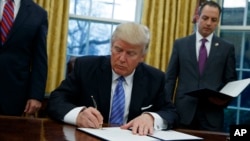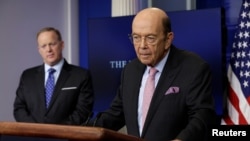President Donald Trump will spend his 100th day in office talking tough on trade in one of the states that delivered his unlikely win.
The president is expected to sign an executive order Saturday that will direct his Commerce Department and the U.S. Trade Representative to perform a comprehensive study of the nation’s trade agreements to determine whether America is being treated fairly by its trading partners and the 164-nation World Trade Organization.
It’s one of two executive orders the president will sign at a shovel factory in Pennsylvania’s Cumberland County, the kind of place that propelled his surprise victory.
Rally in Pennsylvania
The last week has been a frenzy of activity at the White House as Trump and his team have tried to rack up accomplishments and make good on campaign promises before reaching the symbolic 100-day mark. In addition to the visit to the Ames tool factory, which has been manufacturing shovels since 1774, the president will hold one of his signature campaign rallies in Harrisburg to cap the occasion.
It’s a return to fundamentals for a president who has, in recent days, sounded wistful reflecting on his term so far.
Earlier this week, Trump announced his intention to work to renegotiate the North American Free Trade Agreement. He also said he would begin renegotiating a free trade deal with South Korea, with which the U.S. has a significant trade deficit.
Trade discussed every day
“There isn’t a day that goes by that the president doesn’t discuss some aspect of trade,” Commerce Secretary Wilbur Ross said at the White House Friday.
The executive orders signed Saturday will mark Trump’s 31st and 32nd since taking office, the most of any president in his first 100 days since World War II. It’s a jarring disconnect from Trump’s rhetoric during the campaign, when he railed against his predecessor’s use of the tool, which has the benefit of not needing congressional sign-off.
The more significant of the two orders will give the Commerce Department and the U.S. Trade Representative 180 days to identify violations and abuses under the country’s trade agreements and recommend solutions.
World Trade Organization outdated
Ross said the WTO, the Geneva-based arbiter of world trade rules, is bureaucratic and outdated and needs an overhaul. Ross downplayed the possibility that the United States would consider leaving the organization but didn’t rule it out.
“As any multilateral organization, there’s always the potential for modifying the rules,” he said.
The administration argues that unfair competition with China and other trade partners has wiped out millions of U.S. factory jobs. Ross said dissatisfaction with trade policy is one reason voters turned to Trump.
“They’re fed up with having their jobs go offshore. They’re fed up with some of the destructive practices,” he said. “So in effect, the country said in this last election: It’s about time to fix these things. And the president heard that message.”
Trump, who campaigned on a vow to crack down on China and other trading partners, has announced several other moves on trade in recent weeks. He ordered the Commerce Department to study the causes of the United States’ massive trade deficit in goods, $734 billion last year, $347 billion with China alone. The administration is also imposing duties on Canadian softwood timber and is investigating whether steel and aluminum imports pose a threat to national security.
Ross said Friday that the WTO is too narrowly focused on limiting traditional tariffs — taxes on imports — and does little to counter less conventional barriers to trade or to police violations of intellectual property rights.
Trump has pushed a model of “reciprocal trade” agreements in which the U.S. would raise or lower tariffs on a country’s imports depending on how that country treats the U.S.





